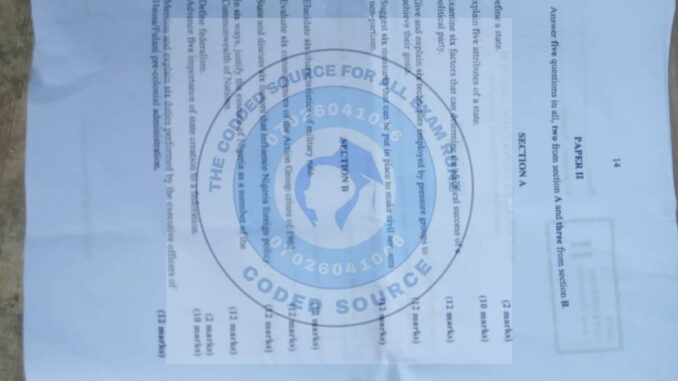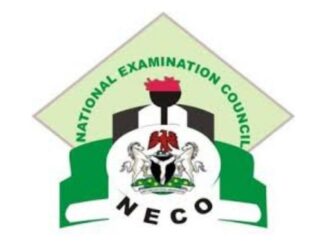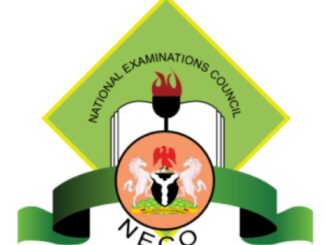
NECO GOVERNMENT-OBJ!Examgrand.Com.Ng
1-10 ECAABDCAAA
11-20 BCEABBEEAD
21-30 BCCCCCCDDA
31-40 EECEBBCEEA
41-50 DEAEEDEABA
51-60 BEAEACCCED
COMPLETED ✅
===============================
📌INSTRUCTIONS
“`✅Answer Five (5) questions in all“`
“`✅Two (2) from Section A and Three (3) from Section B“`
NECO 2023 GOVERNMENT ANSWERS;-ExamgrandComNg !!!!!
(1)

(1a)
(PICK ANY ONE)
State may be defined as a politically organised body of people inhabiting a defined geographical entity with an organized legitimate give legitimate government. The state in this respect is entirely free from external control.
OR
State refers to a political entity or a political organization that possesses sovereign authority over a defined territory and its population. It is a central institution that exercises control and governance within its borders.
(1b)
(PICK ANY FIVE)
(i)Sovereignty: This attribute signifies the state’s ultimate authority and independence within its territorial boundaries. A sovereign state has the power to govern itself without interference from external actors.
(ii)Territory: A state has defined geographical borders that determine its territory. This attribute includes land, water bodies, and airspace over which the state exercises control.
Population: A state consists of a group of people who live within its borders and are subject to its authority.
(iii)Government: A state has a system of governance that establishes the rules, institutions, and processes through which decisions are made and implemented. This attribute includes the executive, legislative, and judicial branches responsible for the administration of the state.
(iv)Law and Order: A state maintains law and order within its territory through the establishment of legal frameworks and enforcement agencies. This attribute ensures the protection of rights, the resolution of disputes, and the maintenance of social order.
(v)Diplomacy: States engage in diplomatic relations with other states, which involves negotiating agreements, participating in international organizations, and representing their interests on the global stage.
(vi)National Identity: States often possess a distinct national identity characterized by shared values, traditions, history, and symbols. This attribute contributes to a sense of belonging and loyalty among its citizens.
(vii)Economic System: States have different economic systems that define how resources are allocated, production is organized, and wealth is distributed. These systems can range from market-oriented capitalism to state-controlled socialism.
(viii)Defense and Security: States are responsible for safeguarding their territories and citizens from external threats. This attribute includes maintaining armed forces, conducting national security policies, and participating in collective defense alliances.
=======================================
CLICK HERE TO JOIN OUR TELEGRAM CHANNEL FOR ALL 2023 EXAM ANSWERS FOR FREE
JOIN OUR TELEGRAM CHANNEL TO KNOW WHEN ANSWERS ARE POSTED!!!!
=======================================
(2)

(2)
(i)Ideology: Political parties with clear and appealing ideologies tend to attract and retain more supporters.
(ii)Leadership: The quality and popularity of a party’s leadership play a significant role in determining its electoral success.
(iii)Financial Resources: Adequate financial resources, improved fundraising strategies, and financial accountability help political parties to compete effectively in elections.
(iv)Media: The effective use of media and advertising campaigns can help to shape public opinion and influence voting patterns.
(v)Voter Turnout: The number of registered voters who actually turn up on Election Day can impact the outcome of elections, especially in close contests.
VICoalition Building: The ability to build alliances with other political groups can help a political party to expand its base of support and win elections.
=======================================
(3)
(i)Lobbying: The use of direct or indirect communication with policymakers to influence policy decisions or legislation.
(iii)Public Demonstrations: Pressure groups often organize protests, rallies, and public demonstrations to raise public awareness about their agenda and build support.
(iii)Litigation: Pressure groups pursue legal action to challenge government policies or regulations that conflict with their interests.
(iv)Boycotts: Pressure groups may organize boycotts of products or businesses that do not support their interests or values.
(v)Grassroots Mobilization: Pressure groups may engage in grassroots mobilization to build a coalition of supporters and allies who work together to achieve common goals.
(vii)Media Campaigns: Pressure groups may use media campaigns to raise awareness about their objectives and mobilize a larger audience in support of their cause.
=======================================
(4)
(i)Merit-Based Appointments: It is essential to have a transparent and merit-based appointment process that is focused on the qualifications and experience of candidates rather than their political affiliations.
(ii)Civil Service Codes of Conduct: The establishment of codes of conduct that require civil servants to act impartially and professionally, irrespective of political affiliations.
(iii)Civil Service Commissions: The introduction of independent civil service commissions that oversee appointments, promotions, transfers, and dismissals of civil servants.
(iv)Professional Training: The provision of professional training for civil servants to enhance their skills and knowledge in their areas of expertise, and provide guidelines on ethics and values.
(v)Performance Evaluation: The development of a performance evaluation system that judges performance based on results achieved rather than political loyalty.
(vi)Protection of Civil Servants: Measures to protect civil servants from arbitrary dismissal or victimization based on political affiliation and to preserve their neutrality in political affairs.
=======================================
NUMBER 5
(i) DICTATORSHIP: Military rule give rise to dictatorship because of excess power wield by military governors or heads of state. Military dictatorship involves one man dictating what happens to everyone understands his rule, due to excess power being wielded by then head of state or military governor.
(ii) SUSPENSION OF THE CONSTITUTION: Military government rules by decrees instead of following the constitutional order. Meanwhile, military administration is characterized by absence of rule of law, equality before the law and fundamental human rights.
(iii) COUPS AND COUNTER COUPS: Coup simply means the overthrow of incumbent government by the military. Military rule is contagious in nature. This is because if colonels in one country stage a coup in order to seize political power, colonels in another country may be aspired also to carry out their own coups.
(iv) ABSENCE OF ELECTION: In military administration the officials are not elected as in the democratic system of government. Therefore, they are not elected as such and are not representative of the people.
(v) TRIAL OF CIVILIAN OFFICIALS: When army comes into power through military coup d’état, one of its duties is to try the former politicians or former leaders especially the corrupt government officials. The aim of these trials is for the military to recover every looted fund from corrupt politicians.
(vi) ABUSE OF HUMAN RIGHT: The abuse of human natural right is common with military regime. Brutality, torture and abuse of rights are one of the characteristics of military rule. The army is known by use of force and operations obey the last order, to handle the civilian population.
========================================
(6)
(i) Political Instability: The Action Group crises led to a period of political instability in Nigeria. The conflict within the party resulted in factionalism and infighting, weakening the overall political structure
(ii) Regional Divisions: The crises exacerbated regional divisions within Nigeria. The Action Group had strong support in the Western region, and the internal conflicts intensified the divide between the Western region and other regions of the country.
(iii) Decline of the Action Group: The crises significantly weakened the Action Group as a political force. The party splintered into factions, leading to a loss of public confidence and electoral support.
(iv) Rise of Military Intervention: The crises created a power vacuum and a perception of political instability. This provided an opportunity for the military to intervene in the political affairs of Nigeria. The subsequent military coups in 1966 and the subsequent military rule that followed were influenced, in part, by the fragility of the political system resulting from the Action Group crises.
(v) Erosion of Democratic Processes: The Action Group crises highlighted the fragility of Nigeria’s democratic processes. The breakdown of trust and the use of violence within the party undermined the principles of democracy, such as fair elections and peaceful transitions of power
(vi) Socioeconomic Impact: The political instability caused by the Action Group crises had adverse effects on Nigeria’s socioeconomic development. The government’s focus shifted away from addressing critical issues such as infrastructure development, education, and poverty reduction.
===========================
(7)
(i) National Security: Ensuring national security is a primary concern for any country, and it significantly influences foreign policy decisions. Nigeria faces security challenges such as terrorism, insurgency, and cross-border conflicts. These security concerns drive Nigeria’s foreign policy objectives, including cooperation with regional and international partners, intelligence sharing, and efforts to combat terrorism.
(ii) Economic Interests: Economic considerations play a crucial role in shaping Nigeria’s foreign policy. Nigeria is an oil-rich nation, and its economy heavily relies on oil exports.
(iii) Regional Leadership: As the most populous country in Africa and a regional power, Nigeria seeks to exert leadership and influence within the African continent. Nigeria plays an active role in regional organizations like the African Union (AU), Economic Community of West African States (ECOWAS), and the Gulf of Guinea Commission
(iv) Political Stability: Nigeria’s foreign policy is influenced by the need to maintain political stability both domestically and in its neighboring countries.
(v) Historical Factors: Historical experiences and relationships also shape Nigeria’s foreign policy. Nigeria was a former British colony and gained independence in 1960. Its history of colonization and struggles for independence have influenced its worldview and foreign policy objectives.
(vi) Global Alliances and Multilateralism: Nigeria actively participates in international organizations such as the United Nations (UN) and strives to maintain positive relationships with major global powers.
========================
(8)
(PICK ANY SIX)
(i)Historical Ties: Nigeria’s membership in the Commonwealth of Nations can be justified based on historical ties. The Commonwealth provides a platform for maintaining connections and cooperation with other countries that were also once part of the British Empire.
(ii)Shared Values: Nigeria’s membership in the Commonwealth is based on shared values such as democracy, the rule of law, human rights, and good governance. The Commonwealth serves as a forum where member countries can collaborate on upholding and promoting these values.
(iii)Economic Cooperation: Nigeria benefits from economic cooperation within the Commonwealth. Membership provides opportunities for trade, investment, and economic partnerships with other member countries.
(iv)Development Assistance: Nigeria can access development assistance and support from the Commonwealth and its member countries. This assistance can be in the form of financial aid, technical expertise, and capacity-building programs .
(v)Cultural Exchange: The Commonwealth offers a platform for cultural exchange and cooperation among member countries. Nigeria’s membership allows for the sharing of cultural experiences, traditions, and knowledge with other nations
(vi)Diplomatic Relations: Membership in the Commonwealth enhances Nigeria’s diplomatic relations and global standing. It provides opportunities for engagement in multilateral diplomacy, participation in Commonwealth summits, and networking
(vii)Collaboration on Global Issues: Nigeria can collaborate with other Commonwealth members on global issues such as climate change, security, peacekeeping, and health. The Commonwealth can serve as a platform for joint efforts, sharing best practices, and addressing common challenges.
(viii)Youth Empowerment and Education: The Commonwealth offers programs and initiatives focused on youth empowerment, education, and leadership development. Nigeria’s membership provides opportunities for Nigerian youth to engage in exchange programs, educational scholarships etc
========================
NUMBER 9
(a) Federalism is a system of government in which a written constitution divides power between a central government and several regional governments. It is a system of shared power between a central government and the states.
(b)
PICK ANY FIVE(5)
(i)Clear Division of Power: Federalism allows for a clear division of power between the central government and the states. This ensures that no one branch of government becomes too powerful.
(ii) Checks and Balances: Federalism provides a system of checks and balances between the central government and the states, which helps to prevent any one branch of government from becoming too powerful.
(iii) Increased Representation: Federalism allows for increased representation in government. By dividing power between the central government and the states, citizens are better able to have their voices heard.
(iv) Increased Autonomy: Federalism gives states the autonomy to make their own decisions without the interference of the central government. This allows states to make decisions that are best suited to their own individual needs.
(v) Increased Efficiency: Federalism allows for increased efficiency in government. By dividing power between the central government and the states, government tasks can be completed more quickly and efficiently.
(vi) Increased Flexibility: Federalism allows for increased flexibility in government. By dividing power between the central government and the states, government policies can be adapted to changing circumstances more easily.
(vii) Increased Adaptability: Federalism allows for increased adaptability in government. By dividing power between the central government and the states, government policies can be adapted to changing circumstances more quickly and easily.
========================
(10)
(PICK ANY FIVE)
(i) Emir/Sarkin: The Emir or Sarkin, as the highest-ranking executive officer, had several duties. They maintained law and order, ensured the administration of justice, and protected the interests of the community.
(ii) District Heads/Wakilin Sarki: District heads, known as Wakilin Sarki, were responsible for the effective governance of their respective districts. They implemented the policies and regulations set by the Emir, collected taxes, maintained security, and oversaw local government administration.
(iii) Court Officials: Court officials played significant roles in the administration of justice. The Wazirin, Galadiman, and Madaki were executive officers who advised the Emir, presided over court proceedings, and ensured the fair and equitable resolution of disputes.
(iv) Military Commanders: Military commanders, such as the Dan Masanin, held executive positions in matters of defense and security. They organized and led military forces, protected the community from external threats, and maintained internal peace.
(v) Military Commanders: Military commanders, such as the Dan Masanin, held executive positions in matters of defense and security. They organized and led military forces, protected the community from external threats, and maintained internal peace.
(vi) Advisers and Counselors: Executive officers in the Hausa/Fulani pre-colonial administration included advisers and counselors who provided expertise and guidance to the Emir. These individuals had specialized knowledge in areas such as religion, law, diplomacy, and administration.
(vii) Village/Local Chiefs: Village or local chiefs, known as Hakimi, acted as executive officers at the grassroots level. They oversaw the governance of their respective villages or communities.
========================
Completed 😋
NECO 2023 GOVERNMENT QUESTION;-ExamgrandComNg !!!!!








KEEP REFRESHING TO LOAD MORE ANSWERS
Examgrand loves you all.
We Remain The No1 Accurate Website
CLICK HERE TO CHAT WITH US ON WhatsApp
°°°°°°°°°°°°°°°°°°°°°°°°°°°°°°°°°°°°°°°°°°°°°°°°
Completed!!!




Be the first to comment